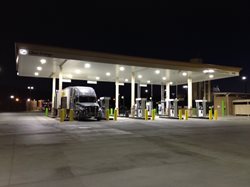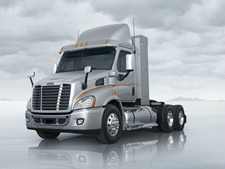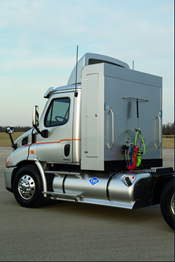 Being that my operations are strictly limited to the “truck friendly” state of California, I am always privy to the newest regulations, usually before the rest of my fellow truckers throughout the rest of this great nation. Given all of the commotion with the newest wave of CARB stories and our ever-increasing need to lower our bottom line, I have been toying with the notion of alternative fuels. The tax credits and incentives for alternative fuel use can vary by area, but California has been known to divvy up for the few pioneers that have trudged through the barriers to explore alternative fuel technology. This category includes such fuels as bio-diesel, propane, LNG, CNG, the little-known DME (being small-scale tested in Sweden according to scdigest.com), as well as hybrid technologies. I decided to concentrate my research and findings on the CNG alternative fuel, as a heavy amount of investing is being done in this area of the fuel spectrum in the way of infrastructure and truck purchases by major players in the trucking industry.
Being that my operations are strictly limited to the “truck friendly” state of California, I am always privy to the newest regulations, usually before the rest of my fellow truckers throughout the rest of this great nation. Given all of the commotion with the newest wave of CARB stories and our ever-increasing need to lower our bottom line, I have been toying with the notion of alternative fuels. The tax credits and incentives for alternative fuel use can vary by area, but California has been known to divvy up for the few pioneers that have trudged through the barriers to explore alternative fuel technology. This category includes such fuels as bio-diesel, propane, LNG, CNG, the little-known DME (being small-scale tested in Sweden according to scdigest.com), as well as hybrid technologies. I decided to concentrate my research and findings on the CNG alternative fuel, as a heavy amount of investing is being done in this area of the fuel spectrum in the way of infrastructure and truck purchases by major players in the trucking industry.
 You may ask yourself, “Why would I want to go and change what has worked for so long?” After all, diesel fuel is a proven method of fueling our trucks and is becoming more and more efficient as time passes. The reasons I consider changes like this are to stay ahead of the curve, change with the times, and adapt my business to the economy of the future. The “cons” of this technology are abundant through “hear-say”, but when researched properly, many can be dispelled entirely or prepared for. These include things like the truck runs out at ¼ tank, you only get 5-6 mpg at best, and you are just a big “rolling bomb” waiting to get hit and go off. As you may well know, not a lot of research goes into rumors and with a little digging for the truth, much can be said about these problems.
You may ask yourself, “Why would I want to go and change what has worked for so long?” After all, diesel fuel is a proven method of fueling our trucks and is becoming more and more efficient as time passes. The reasons I consider changes like this are to stay ahead of the curve, change with the times, and adapt my business to the economy of the future. The “cons” of this technology are abundant through “hear-say”, but when researched properly, many can be dispelled entirely or prepared for. These include things like the truck runs out at ¼ tank, you only get 5-6 mpg at best, and you are just a big “rolling bomb” waiting to get hit and go off. As you may well know, not a lot of research goes into rumors and with a little digging for the truth, much can be said about these problems.
 If you are fueling with a compressed gas, of course it is going to be subject to pressurization fluctuation. Any gas will start to gain or lose density and pressure characteristics with temperature fluctuations…that’s just science. Even diesel fuel can have different burn and storage characteristics with temperature changes (gelling, hot fuel, etc.). If you pay attention to the pressure in the tanks and not the level on the dash, you will better be able to gauge when it is time to refuel. The tanks that the gas is stored in are safety tested. Of course the many agencies involved in vehicle certification would not allow a highly explosive danger like this to be piloted on our roads without adequate testing to prove it is safe for all highway-goers. In the event a tank is punctured, they are designed to safely expel the gas into the atmosphere. CNG has an exemplary safety record in all highway vehicle applications. As for the inefficiency hinted at by the statement that you can only get 5-6 mpg on CNG…well this is true...to an extent! BUT…lets take a look into two important things. First, the fuel burns cleaner, as to allow less harmful release even if it is burning more than its diesel equivalent. Second, it costs less than its more “burn-friendly” counterpart. With an average of over a dollar less per gallon-equivalent over diesel, you may still think it’ll cost more in the long run. As I am not one to let myths go untested, here is a spreadsheet to save the day! This is based on how I currently run my truck on diesel versus how a CNG truck would operate being used in my line of work.
If you are fueling with a compressed gas, of course it is going to be subject to pressurization fluctuation. Any gas will start to gain or lose density and pressure characteristics with temperature fluctuations…that’s just science. Even diesel fuel can have different burn and storage characteristics with temperature changes (gelling, hot fuel, etc.). If you pay attention to the pressure in the tanks and not the level on the dash, you will better be able to gauge when it is time to refuel. The tanks that the gas is stored in are safety tested. Of course the many agencies involved in vehicle certification would not allow a highly explosive danger like this to be piloted on our roads without adequate testing to prove it is safe for all highway-goers. In the event a tank is punctured, they are designed to safely expel the gas into the atmosphere. CNG has an exemplary safety record in all highway vehicle applications. As for the inefficiency hinted at by the statement that you can only get 5-6 mpg on CNG…well this is true...to an extent! BUT…lets take a look into two important things. First, the fuel burns cleaner, as to allow less harmful release even if it is burning more than its diesel equivalent. Second, it costs less than its more “burn-friendly” counterpart. With an average of over a dollar less per gallon-equivalent over diesel, you may still think it’ll cost more in the long run. As I am not one to let myths go untested, here is a spreadsheet to save the day! This is based on how I currently run my truck on diesel versus how a CNG truck would operate being used in my line of work.
| Miles Per day |
Diesel MPG |
Diesel/Gal. |
Diesel Cost Per Day |
| 250 |
6.5 |
$3.999 |
$153.81 |
| |
|
|
|
| |
Est. CNG MPG |
Avg. CNG/DGE |
CNG Cost Per Day |
| |
5.5 |
$2.75 |
$125.00 |
| |
|
|
|
| |
Savings Per Day on CNG = |
$28.81 |
| |
Savings Per Week on CNG = |
$144.04 |
| |
Yearly Avg Savings on CNG = |
$7,490.00 |
|
As you can see from my findings, a CNG truck would save me a considerable amount of money over the course of a year. Sure the technology is not cheap, but as with anything in this industry that costs money, you have to look at it as a long-term investment. Being that this technology is still blossoming and relatively limited in terms of infrastructure, it remains primarily a local and regional-use fuel alternative. As natural gas companies are investing into the infrastructure and our surplus of natural gas grows though efficiencies in fracking technology, it will become a much more lucrative and far-reaching energy source. Freightliner has already proven it can span the width of our country in it's "LA to DC on CNG" campaign (video featured at the end of this blog). Natural gas will allow a more sustainable fuel and create less dependence on foreign oil to meet the demands of the growing population our industry serves. With my favorite little truck stop partnering with a alternative fuels company to open their own CNG/LNG fueling station right in the center of my operating area, you may just see a truck like this make its way into my business operations!